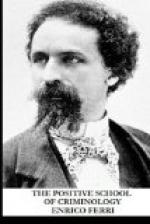The classic school of criminology says “No,” and for my part I agree with them. Francesco Carrara says: “There are blind passions, and others which are reasonable. Blind passions deprive one of free will, reasonable ones do not. Blind and excusable passions are fear, honor, love, reasonable and inexcusable ones are hatred and revenge.” But how so? I have studied murderers who killed for revenge and who told me that the desire for revenge took hold of them like a fever, so that they “forgot even to eat.” Hate and revenge can take possession of a man to such an extent that he becomes blind with passion. The truth is that passion must be considered not so far as its violence or quantity are concerned, but rather as to its quality. We must distinguish between social and anti-social passion, the one favoring the conditions of life for the species and collectivity, the other antagonistic to the development of the collectivity. In the first case, we have love, injured honor, etc, which are passions normally useful to society, and aberrations of which may be excused more or less according to individual cases. On the other hand, we have inexcusable passions, because their psychological tendency is to antagonize the development of society. They are antisocial, and cannot be excused, and hate and revenge are among them.
The positive school therefore admits that a passion is excusable, when the moral sense of a man is normal, when his past record is clear, and when his crime is due to a social passion, which makes it excusable.
We shall see tomorrow what remedies the positive school of criminology proposes for each one of these categories of criminals, in distinction from the measuring of doses of imprisonment advocated by the classic school.
We have thus exhausted in a short and general review the subject of the natural origin of criminality.—To sum up, crime is a social phenomenon, due to the interaction of anthropological, telluric, and social factors. This law brings about what I have called criminal saturation, which means that every society has the criminality which it deserves, and which produces by means of its geographical and social conditions such quantities and qualities of crime as correspond to the development of each collective human group.
Thus the old saying of Imetelet is confirmed: “There is an annual balance of crime, which must be paid and settled with greater regularity than the accounts of the national revenue.” However, we positivists give to this statement a less fatalistic interpretation, since we have demonstrated that crime is not our immutable destiny, even though it is a vain beginning to attempt to attenuate or eliminate crime by mere schemes. The truth is that the balance of crime is determined by the physical and social environment. But by changing the condition of the social environment, which is most easily modified, the legislator may alter the influence of the telluric




